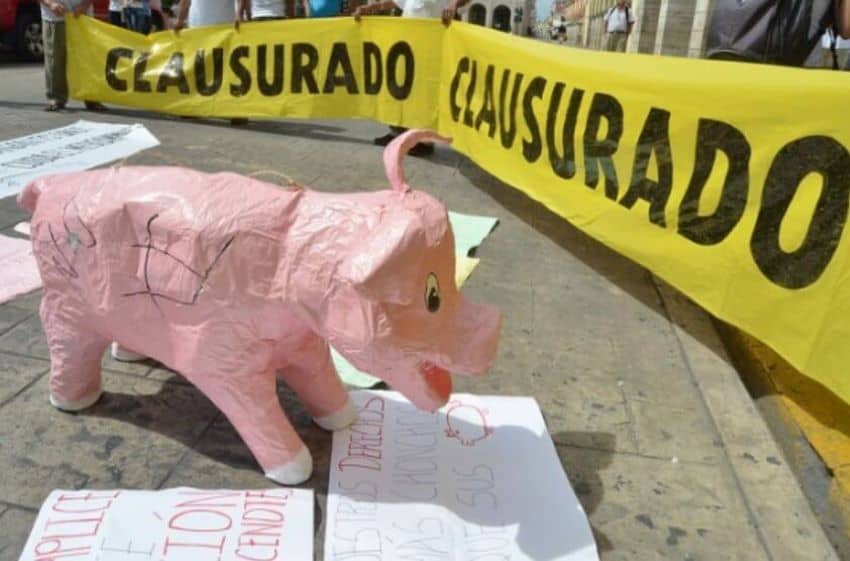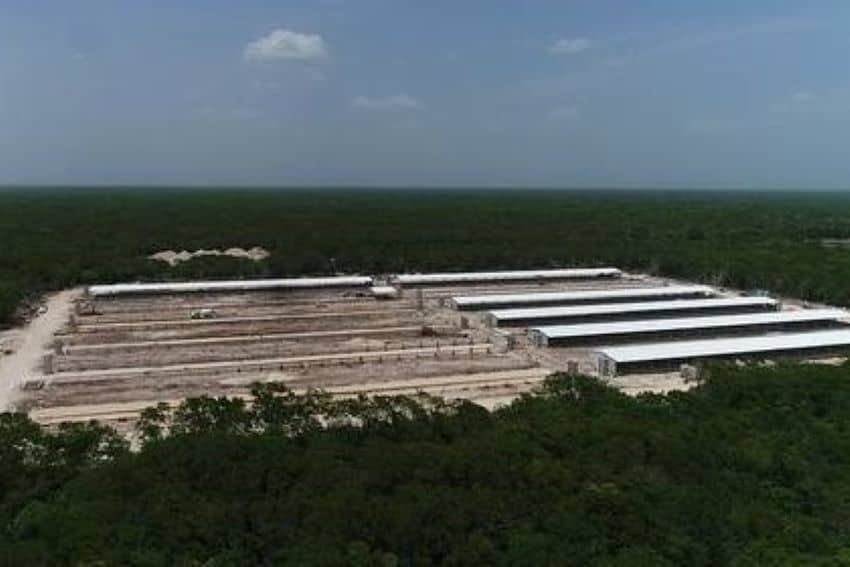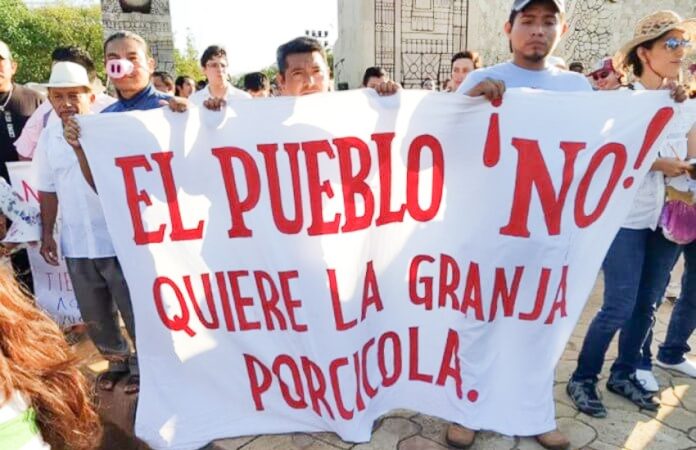A group of conservation organizations, scientists, doctors and public health experts have filed a legal brief with the Supreme Court (SCJN) to support a case against a 49,000-head hog farm in Yucatán.
Earthjustice, a nonprofit environmental law organization, filed a friend of the court brief on Wednesday on behalf of itself, the Center for Biological Diversity, Coastal Carolina Riverwatch, Greenpeace México, Waterkeeper Alliance and 13 experts.
The groups asked the SCJN to uphold a 2018 Yucatán court decision which, on environmental grounds, suspended operations at the farm, located about 50 kilometers southeast of Mérida near the Mayan town of Homún.
The court will hear the case later this year.
The environmental groups said in a statement that their brief supports constitutional claims raised by Maya children who oppose the pig farm’s approval and operation.
Citing arguments to be presented in the lawsuit, they said the decision to allow the massive facility in “an ecologically sensitive area” near Homún “violates the Mayan children’s rights to a healthy environment and to autonomy as indigenous people.”
The groups said their amicus curiae brief details “substantial scientific evidence about the grave and irreversible harm to human health and the environment associated with industrial hog operations.”
The harm includes “contamination of water, including naturally occurring freshwater wells known as cenotes; emission of noxious air pollution; the spread of dangerous pathogens and contribution to climate change,” they said.
Hannah Connor, a senior attorney at the Center for Biological Diversity, said that pollution from industrial pig farms “has already disproportionately degraded huge swaths of indigenous land and water in the Yucatán Peninsula.”
Adding another “mega-operation” will “overwhelm this fragile ecosystem with farm animal excrement and noxious gases,” she said.
Dr. Jill Johnson, an assistant professor of preventative medicine at the University of Southern California who joined the brief, noted that “numerous scientific studies provide evidence that industrial hog operations release contaminants into neighboring communities, where they affect the health and quality of life of neighbors.”

She said that such operations have been associated with increases in asthma symptoms, blood pressure and stress and anxiety among residents living nearby.
Offensive odors would also likely affect people living near the Homún pig farm if the SCJN allows it to resume operations.
According to the conservation groups, the farm is expected to generate over 272 million kilograms of urine and feces annually, an amount, they said, more than that generated by the human population of Tijuana, a city of more than 2 million people.
The pig waste “will be stored in uncovered pits and then disposed of on nearby fields, a practice employed by many industrial animal operations in the United States,” the groups said.
Dr. Ana Maria Rule, an assistant professor of environmental health and engineering and director of the exposure assessment lab at Johns Hopkins University who also joined the amicus brief, said that hurricanes could cause the waste pits to overflow.
“The Yucatán Peninsula is frequently impacted by hurricanes, which will likely cause this facility’s waste pits to overflow,” she said. “It has happened in the United States several times in recent years …”
Kelly Hunter Foster, senior attorney for Waterkeeper Alliance, said that extensive scientific research has shown that industrial-scale pig farms that use waste pits and land disposal of urine and excrement can contaminate groundwater, pollute surface waters and emit hazardous gases into the air.
The environmental organizations noted that “the Ring of Cenotes Geohydrological Reserve, located in Homún on a site of global and ecological importance, is especially vulnerable to pollution” from the farm, owned by the company Producción Alimentaria Porcícola, or PAPO.
Guillermo Zúñiga Martinez, an attorney with Earthjustice, said the SCJN has an obligation to not allow the farm to resume operations until it installs advanced waste treatment technology.
“Mexican and international law require authorities to apply the precautionary principle, and the message of the precautionary principle is clear: we must stop unacceptable risks before harm occurs,” he said.
“… Authorities shouldn’t wait for children to get sick before acknowledging what everyone knows to be true: advanced waste-treatment technology is necessary to protect people and the environment, and this facility must adopt functional advanced technology before operations resume.”

The environmental organizations’ statement noted that the Center for Biological Diversity and Greenpeace México last month submitted a separate request to Mexican authorities “urging that they respect the sovereign right of indigenous communities under Mexican law and basic human rights, including self-determination and consultation, on the permitting and operation of industrial hog operations in the states of Yucatán, Campeche and Quintana Roo.”
The two groups asked that the federal government accept a complaint from 21 Mayan communities that requests a moratorium on all approvals of new industrial hog operations, as well as the expansion of existing operations, until the rights of the Mayan people and ongoing damage to air and water quality, biodiversity and human health are respected and resolved.
In an environmental impact statement submitted to environmental authorities in Yucatán, PAPO acknowledged that its farm could cause some moderate impacts to the environment. However, the company said that it had a range of tools at its disposal to mitigate those impacts. PAPO said that urine and feces will be sent to “a treatment system with a biodigester, aeration pond and a chlorination tank.”
Once the waste has been treated, it will pose no contamination risk, company representative Ricardo Díaz Montes said in 2018.
The farm’s establishment in Homún has divided residents: many oppose it on environmental grounds, but others support it because of the jobs it will generate. The company has said that a fully operational farm would support 75 full-time jobs.
Mexico News Daily
